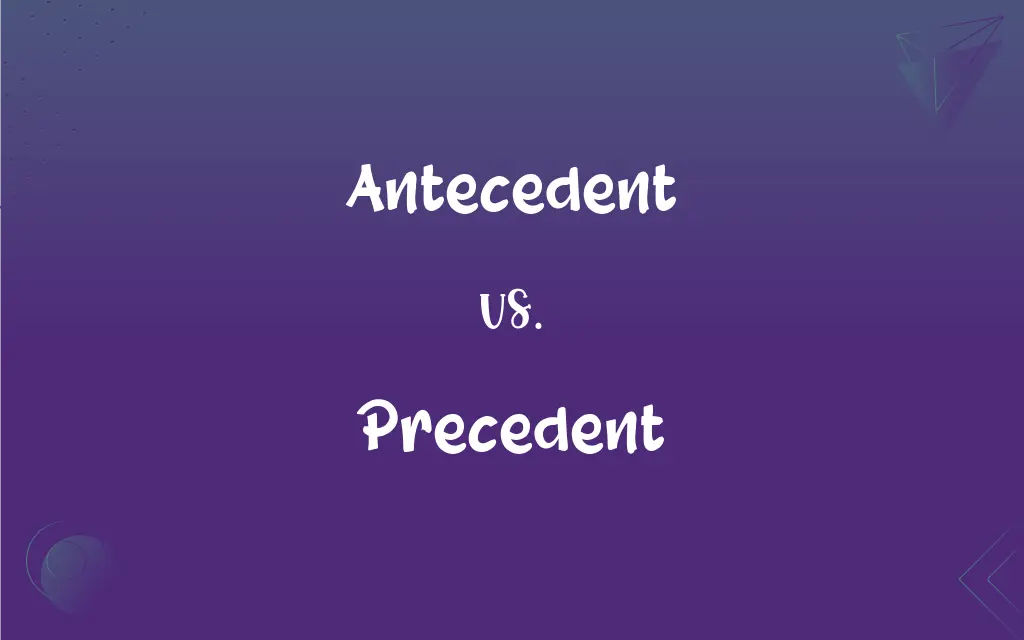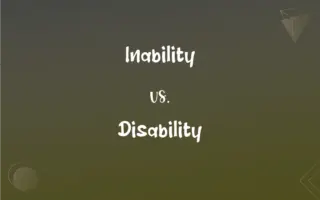Antecedent vs. Precedent: What's the Difference?
Edited by Harlon Moss || By Janet White || Updated on September 28, 2023
"Antecedent" refers to an event, condition, or word that precedes another, while "Precedent" is a previous occurrence or action that serves as an example or guide for subsequent situations.

Key Differences
"Antecedent" and "Precedent" are two terms that denote things which come before. However, their context and usage make them distinct from each other.
"Antecedent" often carries a linguistic tone, mainly used to denote a word or phrase that a pronoun refers to in a sentence. For instance, in the sentence, "Sarah dropped her bag," "Sarah" is the antecedent of "her." On the other hand, "Precedent" is prominently a legal term indicating an earlier event or action that sets an example or standard for future similar events or actions.
Additionally, "Antecedent" can refer to an ancestor or the events, conditions, or attributes of the past that influence present conditions or events. In contrast, "Precedent" emphasizes the authoritative aspect of a prior decision, especially in legal contexts, and how it can be referred to for guidance in future decisions.
Understanding "Antecedent" primarily revolves around recognizing its context within a sentence or a chain of events. "Precedent" is about acknowledging the influence of past actions, particularly their guidance for future decisions.
In essence, while both "Antecedent" and "Precedent" regard what comes before, the former is broader and can relate to grammar or prior events, while the latter often pertains to authoritative examples set by previous actions.
ADVERTISEMENT
Comparison Chart
Definition
Something that precedes another
An earlier event or action that serves as a guide
Contextual Emphasis
Often linguistic or relating to prior events
Primarily legal, emphasizing authoritative past actions
Usage Example
"John lost his wallet." (John is the antecedent)
"The court's decision set a precedent for future cases."
Linguistic Focus
Refers to a prior word a pronoun relates to
Relates to previous events serving as standards
Broader Application
Can refer to ancestors or prior conditions
Refers to prior actions that guide subsequent decisions
ADVERTISEMENT
Antecedent and Precedent Definitions
Antecedent
A word or phrase to which a pronoun refers.
In Alice took her umbrella, Alice is the antecedent of her.
Precedent
An earlier event serving as an example or guide.
The trial set a precedent for future cases.
Antecedent
The conditions that existed before a particular event.
Economic growth had several positive antecedents.
Precedent
A previous way of doing or handling something.
There was no precedent for such a large-scale event in the town.
Antecedent
A precursor or forerunner.
This invention was the antecedent to modern smartphones.
Precedent
An act that serves as a justification for subsequent situations.
His actions set a dangerous precedent for others.
Antecedent
Going before; preceding.
Precedent
A tradition established by long-standing practice.
The school's customs are based on old precedents.
Antecedent
One that precedes another.
Precedent
An act or instance that may be used as an example in dealing with subsequent similar instances.
Antecedent
A preceding occurrence, cause, or event.
Precedent
(Law) A judicial decision that is binding on other equal or lower courts in the same jurisdiction as to its conclusion on a point of law, and may also be persuasive to courts in other jurisdictions, in subsequent cases involving sufficiently similar facts.
Antecedent
Antecedents The important events and occurrences in one's early life.
Precedent
Convention or custom arising from long practice
The president followed historical precedent in forming the Cabinet.
Antecedent
Antecedents One's ancestors.
Precedent
Preceding.
Antecedent
(Grammar) The word, phrase, or clause that determines what a pronoun refers to, as the children in The teacher asked the children where they were going.
Precedent
An act in the past which may be used as an example to help decide the outcome of similar instances in the future.
Antecedent
(Mathematics) The first term of a ratio.
Precedent
(legal) A decided case which is cited or used as an example to justify a judgment in a subsequent case.
Antecedent
(Logic) The conditional member of a hypothetical proposition.
Precedent
An established habit or custom.
Antecedent
Earlier, either in time or in order.
An event antecedent to the Biblical Flood
An antecedent cause
Precedent
The aforementioned (thing).
Antecedent
Presumptive.
An antecedent improbability
Precedent
The previous version.
Antecedent
Any thing that precedes another thing, especially the cause of the second thing.
Precedent
(obsolete) A rough draught of a writing which precedes a finished copy.
Antecedent
An ancestor.
Precedent
Happening or taking place earlier in time; previous or preceding.
Antecedent
(grammar) A word, phrase or clause referred to by a pronoun.
Precedent
Coming before in a particular order or arrangement; preceding, foregoing.
Antecedent
(logic) The conditional part of a hypothetical proposition, i.e. , where is the antecedent, and is the consequent.
Precedent
To provide precedents for.
Antecedent
(logic) The first of two subsets of a sequent, consisting of all the sequent's formulae which are valuated as true.
Precedent
To be a precedent for.
Antecedent
(math) The first term of a ratio, i.e. the term a in the ratio a:b, the other being the consequent.
Precedent
Going before; anterior; preceding; antecedent; as, precedent services.
Antecedent
Previous principles, conduct, history, etc.
Precedent
Something done or said that may serve as an example to authorize a subsequent act of the same kind; an authoritative example.
Examples for cases can but direct as precedents only.
Antecedent
Going before in time; prior; anterior; preceding; as, an event antecedent to the Deluge; an antecedent cause.
Precedent
A preceding circumstance or condition; an antecedent; hence, a prognostic; a token; a sign.
Antecedent
Presumptive; as, an antecedent improbability.
Precedent
A rough draught of a writing which precedes a finished copy.
Antecedent
That which goes before in time; that which precedes.
The Homeric mythology, as well as the Homeric language, has surely its antecedents.
Precedent
A judicial decision which serves as a rule for future determinations in similar or analogous cases; an authority to be followed in courts of justice; forms of proceeding to be followed in similar cases.
Antecedent
One who precedes or goes in front.
My antecedent, or my gentleman usher.
Precedent
An example that is used to justify similar occurrences at a later time
Antecedent
The earlier events of one's life; previous principles, conduct, course, history.
If the troops . . . prove worthy of their antecedents, the victory is surely ours.
Precedent
(civil law) a law established by following earlier judicial decisions
Antecedent
The noun to which a relative refers; as, in the sentence "Solomon was the prince who built the temple," prince is the antecedent of who.
Precedent
A system of jurisprudence based on judicial precedents rather than statutory laws;
Common law originated in the unwritten laws of England and was later applied in the United States
Antecedent
The first or conditional part of a hypothetical proposition; as, If the earth is fixed, the sun must move.
Precedent
A subject mentioned earlier (preceding in time)
Antecedent
The first of the two terms of a ratio; the first or third of the four terms of a proportion. In the ratio a:b, a is the antecedent, and b the consequent.
Precedent
Preceding in time, order, or significance
Antecedent
Someone from whom you are descended (but usually more remote than a grandparent)
Precedent
A decision in a legal case that influences future decisions.
The judge's ruling became a precedent for subsequent cases.
Antecedent
A preceding occurrence or cause or event
Antecedent
Anything that precedes something similar in time;
Phrenology was an antecedent of modern neuroscience
Antecedent
The referent of an anaphor; a phrase or clause that is referred to by an anaphoric pronoun
Antecedent
Preceding in time or order
Antecedent
An ancestor or forebear.
His antecedents came from Ireland.
Antecedent
A preceding event or circumstance.
The war was the antecedent of the country's current state.
FAQs
Why is a legal precedent important?
It provides guidance and consistency in future legal decisions.
Can "Antecedent" refer to ancestors?
Yes, "Antecedent" can denote one's forebears or ancestors.
Is "Precedent" mostly a legal term?
Primarily, yes. It denotes a prior decision that influences subsequent ones.
Does "Antecedent" always relate to grammar?
No, it can also refer to prior events or conditions.
Are "Antecedent" and "Precedent" synonyms?
No, while both relate to things before, they have different contextual meanings.
Can there be negative precedents?
Absolutely, any past action that serves as a guide can be a precedent, positive or negative.
Can a precedent change?
Yes, new decisions or changes in law can establish new precedents.
Can "Antecedent" refer to causes or conditions?
Yes, it can denote the conditions or events preceding another.
How does an antecedent function in grammar?
It's the word or phrase a pronoun refers to in a sentence.
Are all past events considered precedents?
No, only those that set a guide or example for future situations.
Is an antecedent always singular?
No, antecedents can be singular or plural, depending on what the pronoun refers to.
About Author
Written by
Janet WhiteJanet White has been an esteemed writer and blogger for Difference Wiki. Holding a Master's degree in Science and Medical Journalism from the prestigious Boston University, she has consistently demonstrated her expertise and passion for her field. When she's not immersed in her work, Janet relishes her time exercising, delving into a good book, and cherishing moments with friends and family.
Edited by
Harlon MossHarlon is a seasoned quality moderator and accomplished content writer for Difference Wiki. An alumnus of the prestigious University of California, he earned his degree in Computer Science. Leveraging his academic background, Harlon brings a meticulous and informed perspective to his work, ensuring content accuracy and excellence.































































